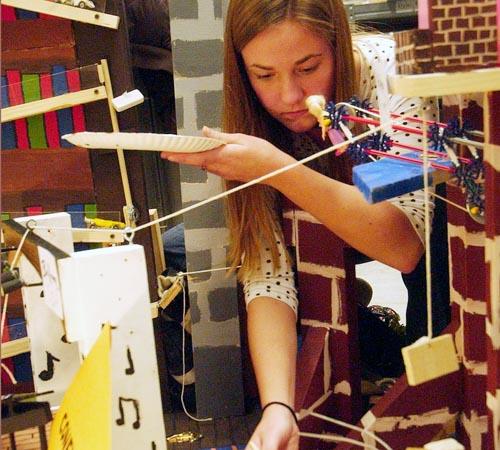Great gizmo: UI students win Rube Goldberg contest

Melissa Sorensen, freshman in Engineering and member of the Illinois Rube Goldberg team, paints the finishing touches on the Rube Goldberg machine at the Engineering Students Project Laboratory on Monday. The Illinois Rube Goldberg team won the Regional Rube Goldberg Machine Contest at Purdue University in February, making them the first non-Purdue team to win the competition. Christine Chung
Mar 11, 2009
How many engineers does it take to change a lightbulb? About 20, if you engineer it to take 70 steps.
More than 35 years after his death, cartoonist and engineer Rube Goldberg’s imagination is still alive and challenging students from around the nation to think of complex solutions to simple problems, pushing them to use their imaginations rather than just rational thought. The more complicated solutions students come up with, the better their machine will be. Goldberg’s cartoon inventions depicted absurdly complicated inventions that accomplished simple tasks.
If it is still a little unclear, think of the children’s game “Mousetrap.” The players have to build a contraption in order to capture the opponents mouse. With each step, the machine becomes more complex until finally it can complete its complicated mouse-catching procedure.
DI multimedia
Students build award-winning machine
Get The Daily Illini in your inbox!
Click to view a slideshow.
Now imagine playing the game on a larger scale, competing against some of the brightest minds across the nation, making the simple task of changing a lightbulb into something imaginative and fun.
For the first time, University students organized a team to compete in the regional competition at Purdue, not only taking first place but also the audience’s choice award in February.
Blair Conner, regional contest chairman, said that this is the first time since 1983 when the contest was first started at Purdue that a non-Purdue team competed in the contest and won.
“Everyone was surprised that a non-Purdue team won, but there wasn’t much disagreement that the University of Illinois machine was the best,” Conner said. “It was very above-par, ran smoothly and looked great.”
With a team of about 20 students, Mickey Mangan, senior in Engineering, put together a machine, centered around the board game “Clue.”
“The theme was so inherent within the machine itself it wouldn’t have worked without it,” Mangan said.
“We thought of the game “Clue,” where you go in a room and can take a secret passage to another. We tried to think of clever ways to integrate the characters and murder weapons. Like at the end, a train turns around the bend to turn on the light bulb, and on the back of it, there is a jail cell that holds the culprit.”
Mangan said the restrictions of the contest spurred creativity rather than limit it, and once the team came up with a theme, the rest just fell into place. He said he could not have entered the competition without the help of Jimmy Kryger, who he called a “Rube Goldberg machine-building machine.”
Kryger, sophomore in Engineering, said he had prior experience with the contest in high school, winning the 2006 Illinois state title. He said this experience is unlike anything students experience in the classroom.
“That’s one thing you don’t get a lot of in the classroom- time to build stuff,” Kryger said. “You are studying and doing problems, but you are not actually building things and seeing how they actually work. We got in here and we thought we knew how things worked because we learned about it in class, but that is not always the case. When you actually build things, you have to tinker with them.”
After months of planning, building, and more than 700 hours of manpower, Mangan and Kryger, along with the rest of the team, completed a machine that ran perfectly for about a minute and a half, using about 70 steps.
The machine, called “The Scene of the Crime”, won the regional and now will be competing on the national level on March 28 at Purdue.
Mangan said he is excited to compete on the national level against top teams.
“Fortunately for us, one of the Purdue teams has won four out of the five last competitions,” Mangan said. “We basically eliminated our fiercest competitor and we are hoping to keep it up nationally.”
Though Mangan graduates this May, Kryger said he looks forward not only to the national competition, but to next year’s competition.
“The best part of going to a competition is that we all have the same task to complete,” Kryger said. “You think your way is the only way to do it but you show up and see that people thought of lots of different ways to do the same thing. It is just amazing what people can think of, but we are going to have to step it up next year to defend our title.”
To check out the machine in person, go to the Engineering open house in Engineering Hall on March 13-14.





